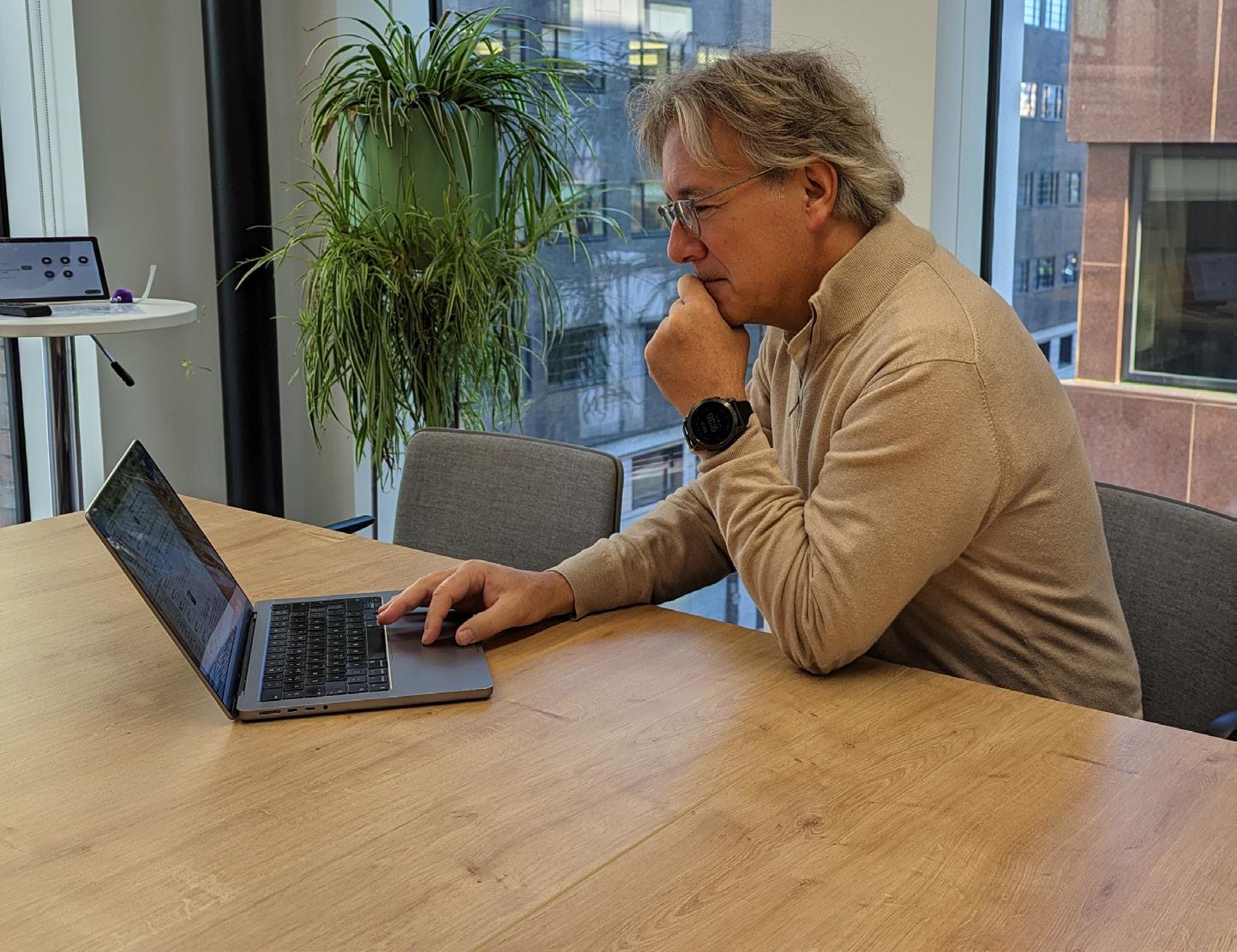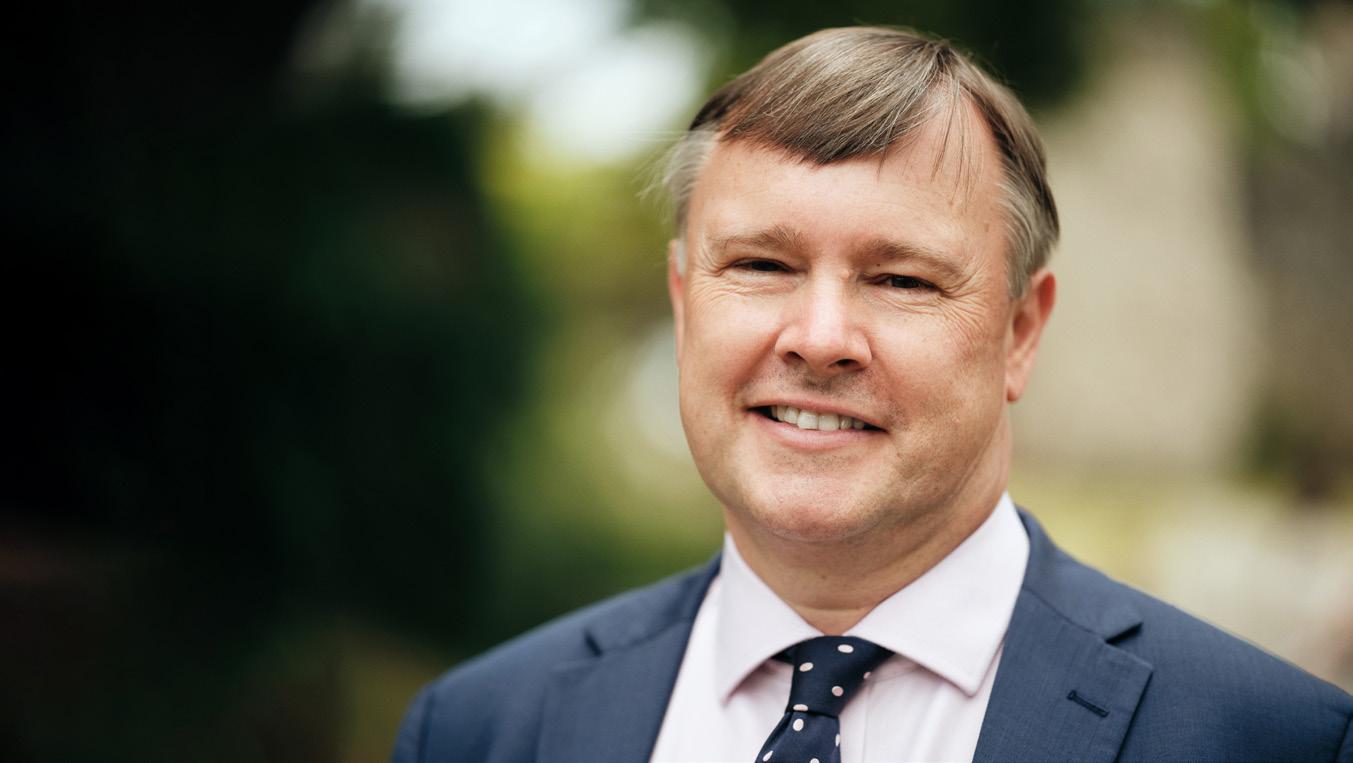
8 minute read
marc deschamps DAI MAGISTER

Marc Deschamps is the Co-Head at DAI Magister, a leading investment bank for global climate tech and tech development in emerging markets. Marc co-founded his first business venture at 17 and is known for pioneering broadband in Europe and the UK. We spoke to Marc about his distinguished career, the differences when working in executive roles for corporate companies and start-ups, and much more.
CAN YOU TELL US A BIT ABOUT YOUR CAREER PRIOR TO CO-FOUNDING DAI MAGISTER?
In short, I’m an AI geek and engineer-turned-entrepreneur, then a corporate leader, and finally, an investment banker to help others. At the core of that, I’ve always been convinced that tech would change the world. That’s the motive and the drive. It changes cognitive inclusiveness, efficiency, and the creativity of people, and that’s what I’ve focused on.

Throughout my career, I’ve created programs for others, and I sold my first company at 19. Later on, I created a company that became the first broadband provider in Europe, then a unicorn company with a big IPO that had Bill Gates as an investor. I also led UK broadband and brought it to the UK as COO of Broadband at BT, and 18 years ago I founded an investment bank that became one of the leading tech investment banks in Europe.
Recently, my focus has been on climate tech and meeting the challenges that climate tech poses to our society. But actually, I’m going back to the beginning because I’m born in the Canadian forest, so I’m a born tree hugger!
SO, IS DOING WHAT YOU ARE NOW ALMOST FULFILLING A LIFELONG DREAM?
A child’s dream, yes. But it’s true! And I think a career is like that. It’s how you can fulfil some dreams, ones that you have initially or ones that you evolve or create, and how to put those dreams into plans, actions, teams, objectives and creations!
WITH THAT IN MIND, HAVE YOU ALWAYS WANTED TO LEAD YOUR OWN BUSINESS OR DID THE DESIRE DEVELOP OVER TIME?
I was lucky right from the start in the sense that my friends and I discovered something that needed help and we took it as a challenge to go and meet that. At that time, it was the timing in Formula One, which was done with young guys doing the math, so we said: “Let’s apply a machine to this.” This helped me to create something, put teams together and deliver, and this empowered me. There are probably some situations in life like that, where creatives think there’s potential there and I’d like to be the one to orchestrate it. So, I think it’s something you probably have somewhere, but you grow and learn your discipline, and I’ve come to appreciate it more over the years.
HOW WOULD YOU DESCRIBE YOURSELF AS A LEADER AND HAS YOUR LEADERSHIP STYLE CHANGED OVER THE YEARS?
There are things that have changed and others that have stayed. As a leader, you need to have a certain drive, and an optimism, even naivety, in a way that you think problems are simple. But then you learn the systemic way of how to bring that into issues, challenges, and tactical points to go and deliver and assign teams to do that. So, whilst you learn that very quickly, at one point you learn how to make people work together because you like it, and you like the people.
But society and the way people work have changed, so the way you transmit good efficiency habits to people has changed. I would say my style has moved from what some people call an enlightened command style to a trust, empowerment and visionary style but where you have to keep the pace and objectives in line at the same time.
ARE THERE ANY AREAS WHERE YOU THINK YOU CAN IMPROVE?
Certainly! I still have a lot to learn when it comes to delivery, even though I’ve done lots of projects, and in the balancing of life - my family and friends will confirm that! Through that journey, I’m learning how efficiency brings you the time and mindset so you can balance that, but you also learn from the challenges, failures and successes throughout your career, and also from the adaptation of working in different environments.
HAVE YOU NOTICED ANY KEY DIFFERENCES BETWEEN WORKING IN EXECUTIVE ROLES FOR LARGE CORPORATES AND START-UPS?
As an entrepreneur starting your company, there is a status of loneliness that you need to break very quickly. Whereas the corporate environment by default is not lonely, provided you can adapt to it. However, an entrepreneur’s loneliness changes because you build and surround yourself with others, but in a corporate environment, you structure the people and teams you work with to do what you need to do, so the starting point may feel different but the end point ought to be the same.
In a large corporation, you also have an aspect of management that is slightly different in the entrepreneurial world: upward management, for example. You feel like a funnel into your work and the difficulty of that is you need to make the delivery aspect your absolute priority and the upward flow as efficient as possible, but it needs to be there because people need to be transparent and help each other.
SO, DO YOU PREFER A PARTICULAR TYPE OF WORKING ENVIRONMENT?
Absolutely not, but life has decided for me differently simply because I’ve been quite successful as an entrepreneur. So, I ought to like it, but I have to say I really adored my corporate years, both at BT and prior to that at Phillips. Great teams and challenges but not easy, and the people are top quality like they are in an entrepreneurial environment. I really liked and would recommend both, although they are very fulfilling in different ways.
In today’s world, we will require and will see more serial entrepreneurs change the planet, but the corporates also have some very good attributes in the delivery of some of those changes, though they need to get more involved. Many corporate leaders have successfully created something that does not feel too dissimilar to the entrepreneurs.
WHAT HAVE BEEN THE BIGGEST CHALLENGES YOU’VE FACED IN YOUR CAREER AND HOW HAVE YOU OVERCOME THEM?
I mentioned loneliness before and that is probably one of the big challenges. In the face of that, it’s the building of teams and trust, so you can manage and spread that vision, and trust, in people. That breaks loneliness, but it is a challenge and if you’re a good entrepreneur, you can break it. The other one is how to balance your work life and your aspirations, which sometimes come before anything else, and balance that with your personal life and your colleagues’ personal lives.
I’ve had experiences of seeing bullying environments and loneliness in other people, so I think inclusiveness, trust and empowerment are very important. That has been my biggest challenge and I’m trying to empower and take away that burden from those around me.
HOW ARE YOU TRYING TO DO THAT?
It’s in the management style of trusting people and listening, which is one thing that I need to improve. But also, in how to work in teams because when you have a temple with one pillar, it’s fragile, but when you have one with many pillars, it holds to any winds.
Considering the IMF is predicting a third of the world will go into recession this year, what are you expecting to see in 2023?
It’s a tough economic and financial trading environment to start with, and yet we have so much to do to bring back balance to our planet. My view is that the current challenges, such as supply chain failures, interest rate hikes and financial markets falling, have slowed down my work in climate tech, but luckily, the sector has been somewhat resilient.
There was about $15bn invested in Europe in 2021 and unlike the falling tech sectors, this was very similar in 2022.
However, everyone was expecting that to grow even further, and the planet needs it to grow if we want to deliver on our required net zero. But I’m an optimist and investments in climate tech are slowly growing back. So, I’m expecting this year will be better than the last for climate tech investments, although the first half of the year could be tough.
ARE THERE ANY PEOPLE, OR TYPES OF PEOPLE, WHO INSPIRE YOU?
I’m motivated by many, including my family and friends who inspire me with their work, creations or balance. I would also say I’m inspired by corporate athletes, but more the athlete in general. This might be an art athlete and how they discipline themselves and push to excel, or in the world of sports where they must do 10,000 hours before becoming a star.
In terms of names, maybe Wayne Gretzky for sports - the Canadian coming out of me - maybe Mandela when it comes to politics and inspiring the world to be better, and maybe people like Bill Gates with their drive and technical vision. All those people are driving me in terms of what I can do with my own little steps for changing this planet.
Comment
David Foster Partner Business Dispute Resolution
David Foster, debt recovery expert at law firm Moore Barlow, highlights the options open to businesses for managing late payers and protecting cashflow.

The cost of doing business is ever rising – skyrocketing inflation, a weak pound and global materials shortages – making protecting cashflow as critical as it has ever been, particularly for SMEs.
But all of these problems only increase the likelihood of customers having their own financial issues that lead to late or unpaid bills. With April’s budget setting season on the horizon, it’s vital firms set themselves up for success and have the debt recovery processes they need in place.
Credit checks
It might seem obvious, but the temptation to jump on an opportunity for revenue, without doing the due diligence, is more acute than ever at the moment. But particularly at an economically volatile time, it’s essential to vet new partners, suppliers and customers to make sure they are financially sound before entering into contracts with them.
Late payment terms and conditions
While there are statutory conditions for late payments, they are lenient, and businesses can weave far more robust conditions intro contracts that more fully protect them. This could include setting out when interest on payments will increase – for example, an increase of 1% for every month a payment is late. Another sensible inclusion is an agreement that the debtor will be liable for legal and agency costs if debt collection services are needed.
WHAT WOULD YOU LIKE YOUR LEGACY TO BE?
Easy, a huggable world. Huggable in the sense that it’s clean, sustainable, and balanced. And for that to deliver it needs corporate finance, investment banking, entrepreneurs, engineers, and the inventions behind it. So, I would like to bring a little bit of that to the planet.
Considering the work I’m doing now, which is trying to create the leading investment bank in climate tech globally, and helping funds and governments to get involved in climate tech and tech development in emerging markets, I hope it converts a lot of people out there to not just be ‘entrepreneurs’ but to be ‘entrepreneurs that make a difference to the planet’.
Proactive communication
It’s important to get ahead of payment issues to reduce the likelihood of it snowballing into a significant cash flow issue. Having automated payment notifications set up is a good starting point, so that letters are sent out the moment payments are due, followed by periodic reminders, meaning less time is wasted chasing money owed. It can also facilitate conversations about cash flow, and whether repayment plans need to be in place to take the pressure off a struggling but valued client.
There is no silver bullet when it comes to ensuring customers pay on time. But these simple steps put a business in the best position to ensure money is flowing in and to protect cashflow.
If you need support with debt recovery and protecting cashflow, please get in touch on 01483 543210.










